Let's Stand with Israel
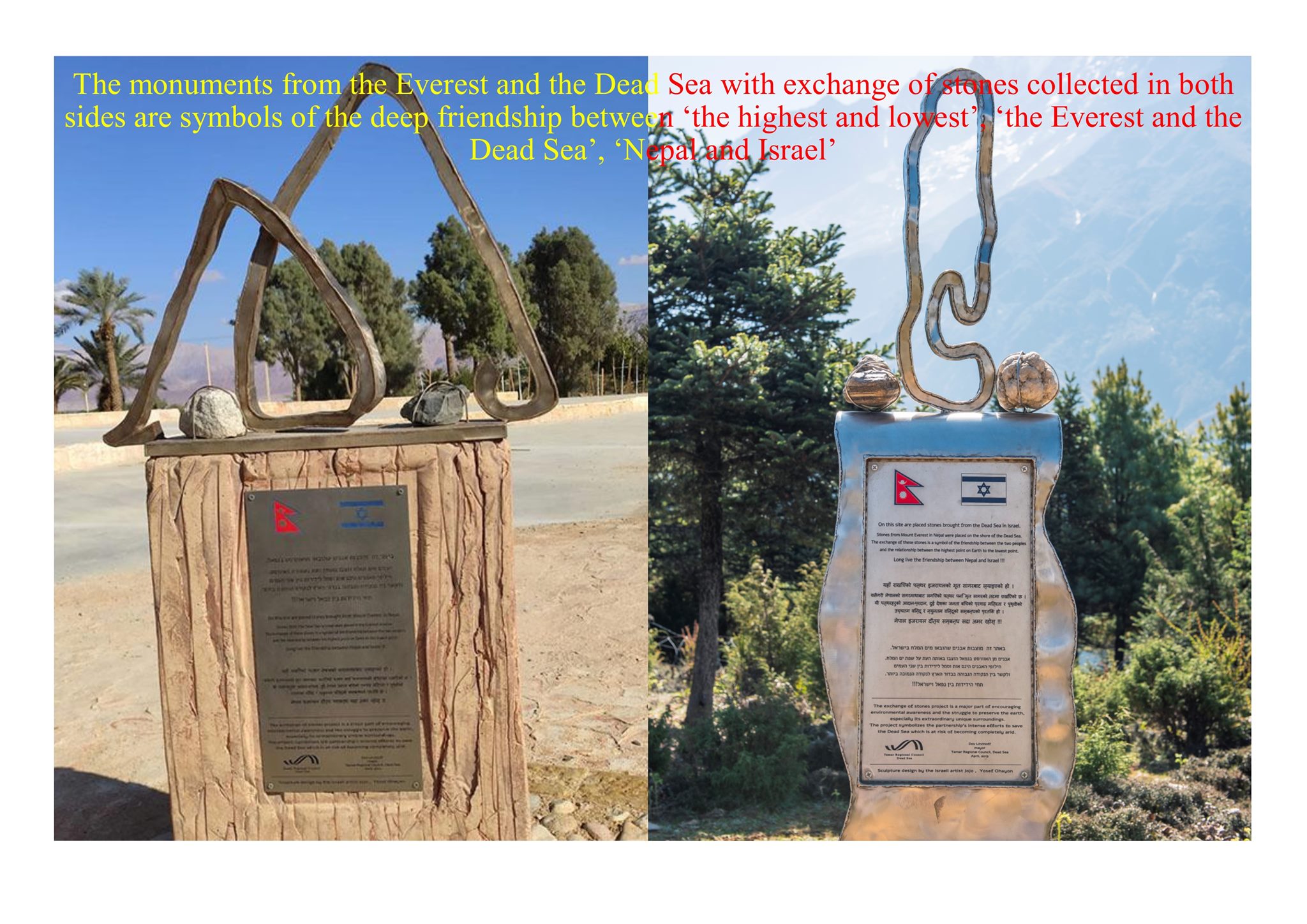
We kicked off the Diamond Jubilee Celebration of Israel's Independence in Nepal on May 2nd week with great joy showing the strong tie between Israel and Nepal as we were and will always remain close friends. Again, marking the historic day, Nepal-Israel celebrated 63 Years of diplomatic relations on June 1 simultaneously. We must remember that Nepal was the first South Asian country to recognize Israel.
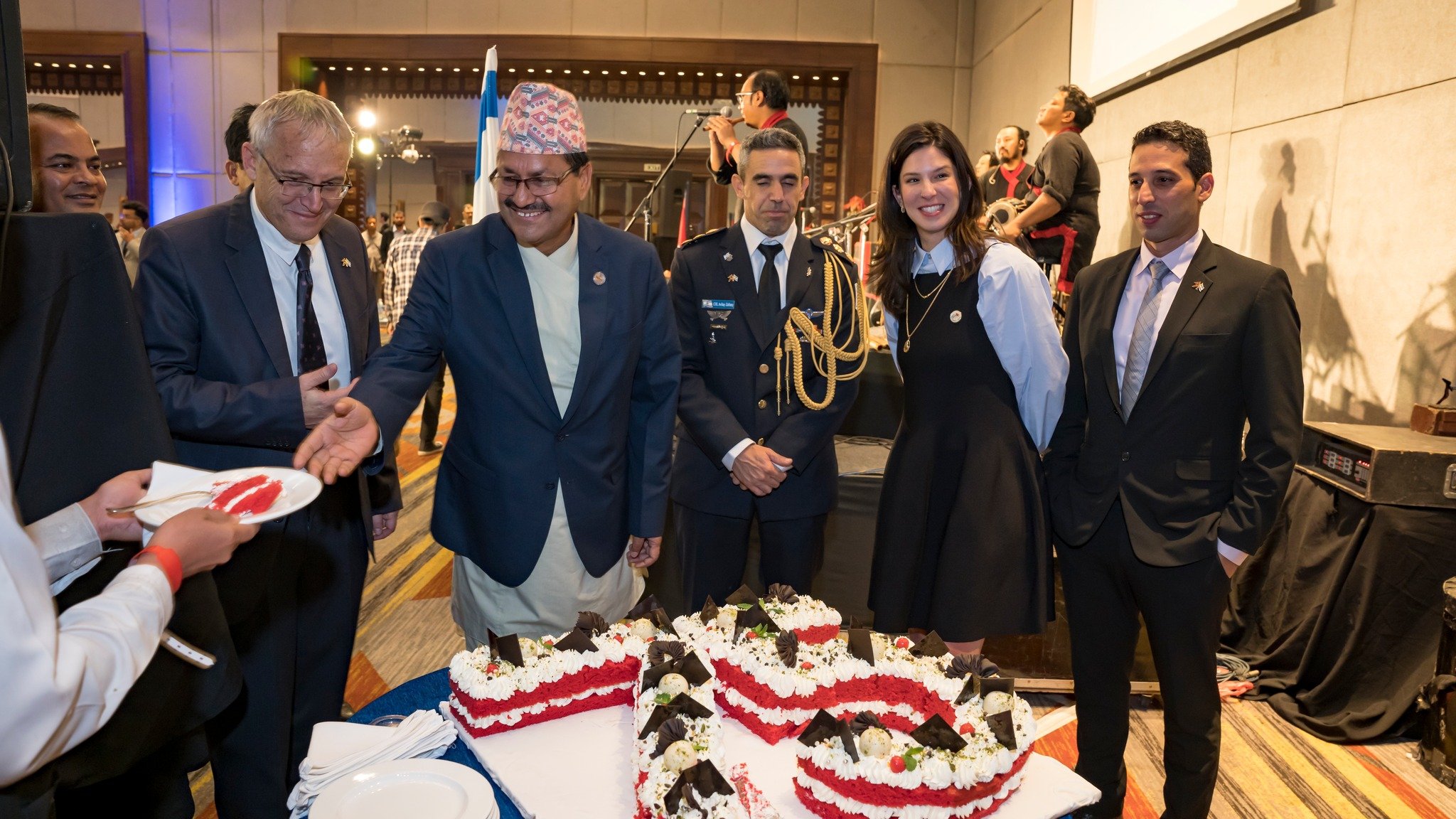
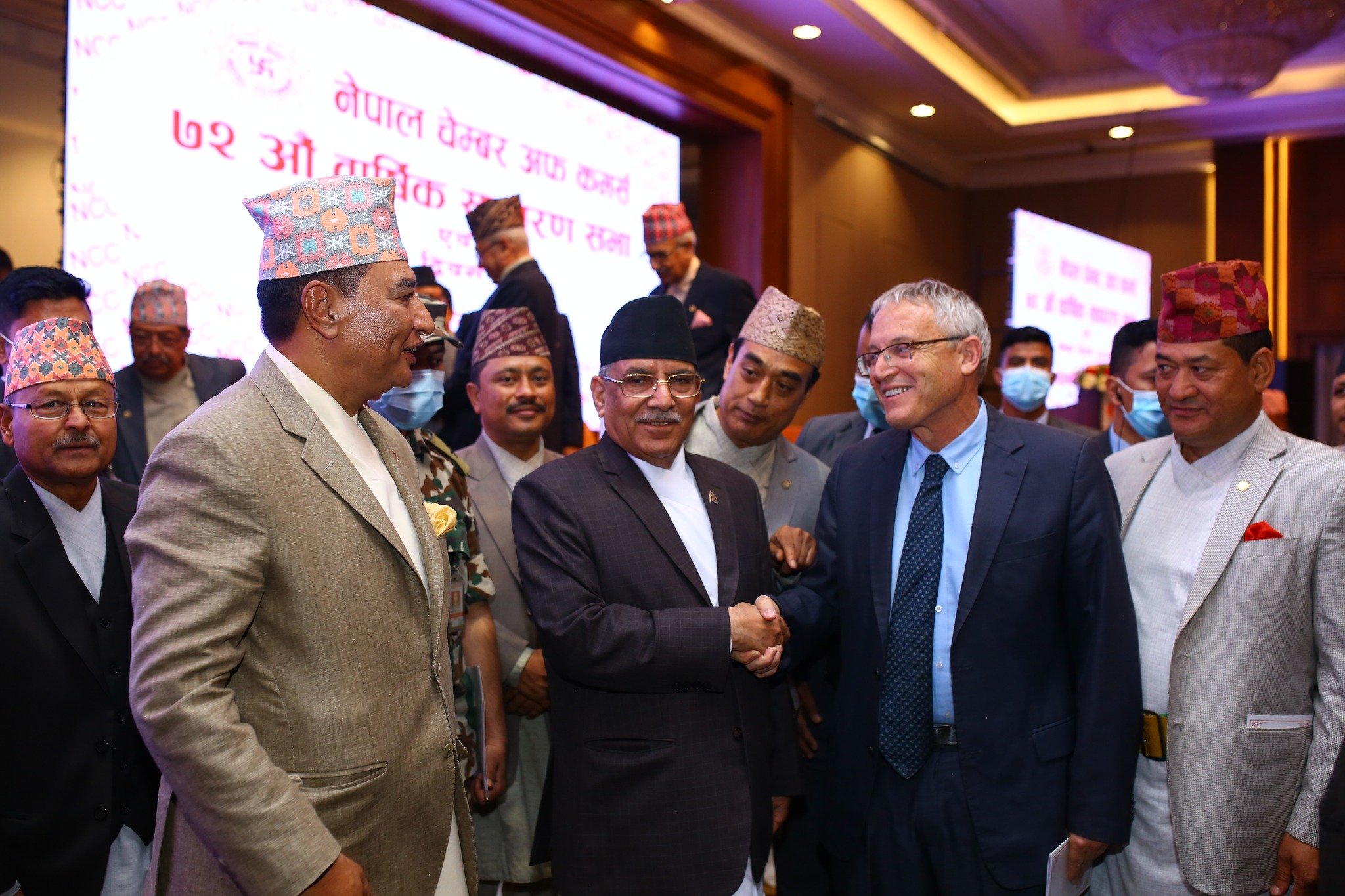
The Embassy of the State of Israel organized a special program in Kathmandu on May 11 to celebrate Israel’s 75th Independence Day as a Diamond Jubilee Celebration. The Embassy celebrated its Independence Day amidst the presence of Vice-President Ram Sahaya Prasad Yadav as the chief guest, Foreign Affairs Minister Narayan Prakash(NP) Saud as a special guest, around 400 guests from government ministers and officials, foreign diplomats, media fraternity, friends, other dignitaries from various walks of life. At the ceremony, the Israeli Ambassador to Nepal Mr. Hanan Goder-Goldberger said that Nepal and Israel should work together to establish world peace. Ambassador Goder reminded the audience about the oldest diplomatic relationship between Nepal and Israel on the occasion. Similarly, On June 1, Ambassador Goder and his Deputy Chief of Mission Ms. Dana Fisher visited the BP Museum, Sundarijal to pay respect to the late BP Koirala.
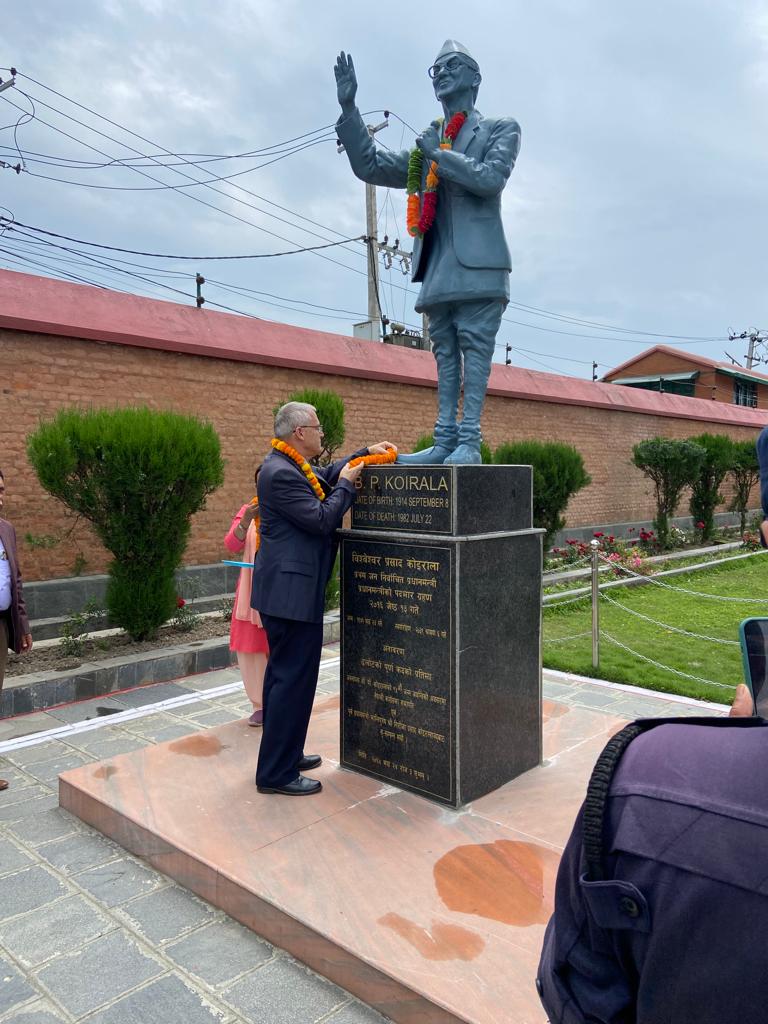
As we deepen our studies on the relations between the two Nations, we must get back to the history of the 1960s.
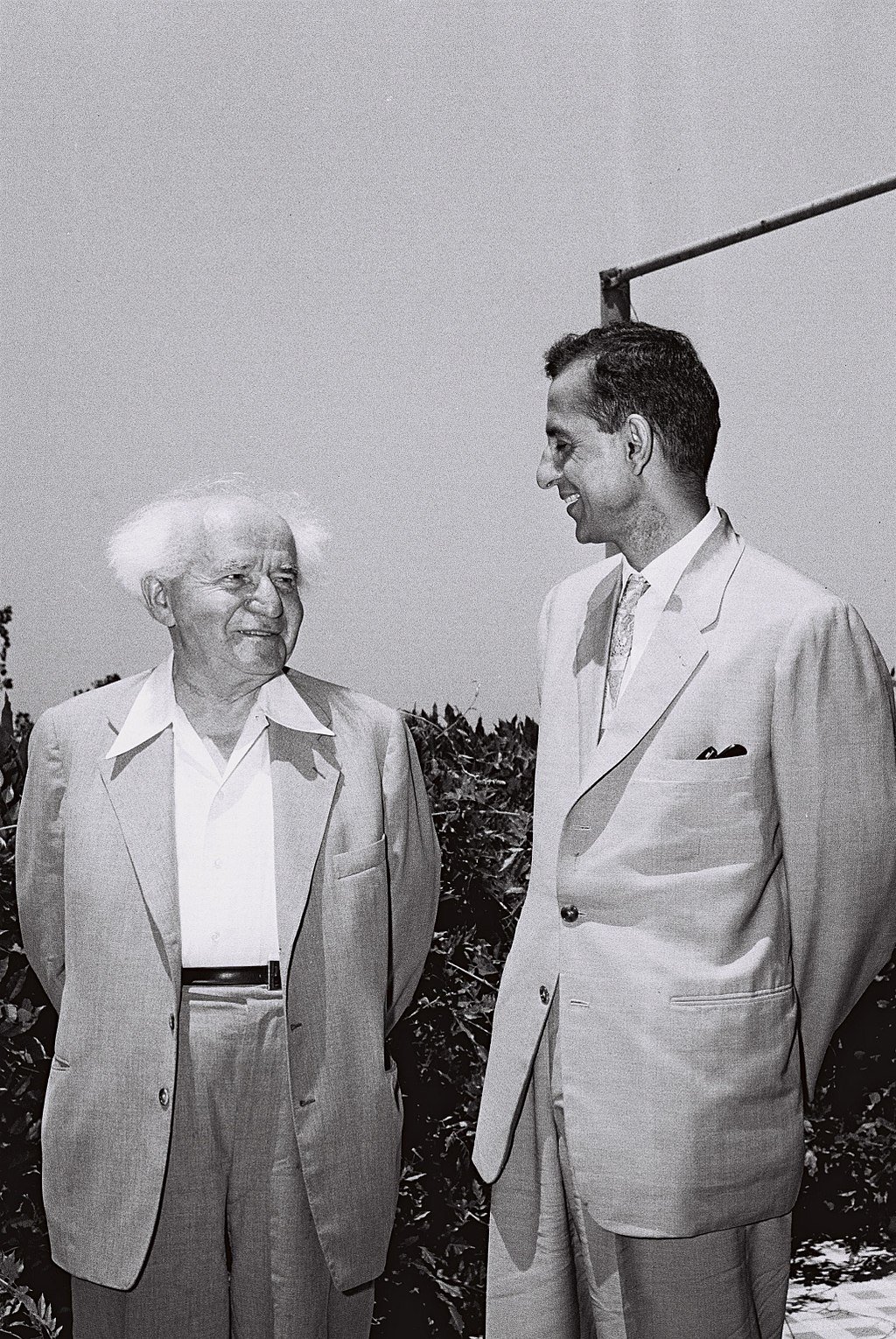
The landmark decision was taken by two courageous leaders, the Late David Ben-Gurion, the first Prime Minister of Israel, and the Late B.P. Koirala, the first Elected Prime Minister of Nepal. Both nations are enjoying friendly and productive bilateral relations in many fields that include agriculture, health, education, and technology among many others.
The two countries (Israel-Nepal) established diplomatic relations on 1 June 1960, making Nepal the third South Asian state to recognize Israel behind Sri Lanka and India, and the first South Asian nation to establish full bilateral ties with it.
A Glance at Bilateral Visits
Late B. P. Koirala, the prime minister of Nepal from 1959- 1960, had a strong pro-Israel foreign policy. Late Prime Minister BP Koirala paid an official visit to Israel in 1960, which was very important in the context that many countries had not recognized and many had outlawed Israel at that time. As seen in history, Various Nepalese political figures, including the king (formerly), heads of government and state, and ministers have all since visited Israel and continued foreign policy.
After coming to power through a military coup that overthrew the democratic government of BP Koirala, the autocratic monarch of Nepal, King Mahendra also paid a State Visit to Israel in September 1963 and met with Prime Minister Levi Eshkol, to rally support for his regime. He maintained Koirala's special relationship with Israel. This was returned by Late Israeli President Zalman Shazar's Official Visit to Nepal later. In 1968, Birendra, then Crown Prince, paid a two-week study visit to Israel. Later Foreign Minister of Israel late Moshe Dayan visited Nepal in April 1979.
After the restoration of democracy in 1990, the then Speaker of the House of Representatives, Daman Nath Dhungana, paid an official visit to Israel in January 1992 at the invitation of the Speaker of the Knesset. On 23–25 June 1993, the then Prime Minister of Nepal, Girija Prasad Koirala paid an Official Visit to Israel. Minister of Agriculture and Local Development Ram Chandra Paudel paid an Official Visit to Israel on 17–21 November 1993. Hasta Bahadur Malla, then Assistant Minister of Education visited Israel to participate in the Jerusalem International Conference of Ministers of Education on January 8-11, 1996. Jhala Nath Khanal, then Minister of Communications paid an official visit to Israel on September 16-22, 1997 at the invitation of the Minister of Communication of Israel. Sahana Pradhan, the Foreign Minister of Nepal, visited Israel and met with Tzipi Livni, the Vice Prime Minister and Minister of Foreign Affairs, President Shimon Peres, and Aaron Abramovich, the Director General of the Ministry of Foreign Affairs, on July 12, 2007, the first time the Nepalese Foreign Minister has visited.
Then, Bilateral visits have continued to date.
Israel Mission in Nepal
The Government of the State of Israel established a residential Mission in Kathmandu in 1961. The Embassy of Nepal in Egypt was concurrently accredited to the State of Israel until the opening of the residential mission in Tel Aviv.
Following the decision of the Government of Nepal, constituted after the success of the historic Peoples’ Movement 2006, to establish a residential embassy in Israel, the Embassy of Nepal came into being on 13 August 2007.
Diplomatic ties between Nepal and Israel date back to the 1960s and many projects have been undertaken to this date to mutually benefit both the countries and its people.
After the establishment of Israel's mission in Kathmandu, Nepal and Israel are working together to further strengthen this already strong bond of friendship not only at the government-to-government level but also at the people-to-people level.
Nepal has maintained diplomatic relations and continues to support the right of Israel to exist within secure and internationally recognized boundaries.
Nepal Benefited from Israel’s Development
Israel is also known as a start-up nation and is one of the pioneers in the development of technology. It shares its expertise learned in the course of its development with friendly nations in many fields through MASHAV (Israel’s Agency for International Development Cooperation). Till date, more than 3,500 Nepalese have been trained in various courses in Israel. On average, 35 officials from different professional backgrounds (affiliated with government as well as non-governmental organizations) go to Israel every year to participate in different trainings. Parallel to that the number of trainees participating in on-the-spot training conducted by Israeli experts in Nepal nears the same number of participants trained in Israel.
Many Nepalese, especially women, are working in Israel as caregivers and they are very much appreciated for their dedication and caring for the elderly people by their families.
The Embassy has joined hands with Sana Kisan Bikas Bank Ltd. (SKBBL), to send the youth farmers from marginalized and underprivileged farmers associated with the networks of Small Farmers Agricultural Cooperative Ltd.(SFACL) for study and training program in Israel known as ‘Learn and Earn’ in the field of agriculture. SKBBL selects students from among SFACL’s 10-lakh member families extended to 68 districts. Every year since 2013, more than 500 students have been trained in different agricultural fields. The students who returned from Israel are presenting themselves as role model farmers in their communities and contributing to Nepal’s agricultural sector development.
Over the years, the bilateral relations between the two countries have engaged in various areas of cooperation, including agriculture, technology, tourism, caregivers, investment, and disaster management. Israel has provided aid and assistance to Nepal during times of crisis, such as after the devastating earthquake in 2015. Israeli search-and-rescue teams were dispatched to Nepal to provide humanitarian support and assistance in the aftermath of the earthquake. From the modernization of the Nepal Army to providing valuable support during the earthquake, and the modernization of Nepal’s agriculture sector and construction industry, Israel, though invisible, has been supporting Nepal in key areas of Nepal’s development.
In recent years, there has also been an increase in tourism between the two countries, with Israeli travelers visiting Nepal to explore its natural beauty and engage in adventure activities like trekking and mountaineering. Overall, while Israel and Nepal are geographically distant and have different geopolitical contexts, they have developed cordial relations and have found areas of cooperation and exchange.
Since the establishment of diplomatic relations, the two countries have been enjoying deep friendship, which is being demonstrated by many high-level visits and undertaking of numerous mutually beneficial cooperation.
Apart from government-level visits, both countries have seen business groups traveling for potential economic collaborations. Nepal is one of the most loved travel destinations for young Israelis and around 10,000 travel enthusiasts come to Nepal every year to enjoy the beauty of Nepal.
Nepal-Israel relations
Two Legs: Good Bilateral, Worst Multilateral Relation
Israel and Nepal are two countries located in different regions of the world, with distinct histories, cultures, and geopolitical situations.
There are two different aspects of cooperation between Nepal and Israel. We already discussed above that bilateral relations were established on June 1, 1960, between Nepal, which is located in the arms of the world's highest Mount Everest, and Israel, a country on the shores of the Mediterranean Sea, which has the lowest point, the Dead Sea. From the highest point to the lowest point, from 8 kilometers high Mount Everest down to below ocean level of the Dead Sea.
Nepal has a strong relationship in accordance with the bilateral relation but When we go through the multilateral relationship, Nepal is not able to be in favor of Israel in United Nations.
It does not mean that Nepal has not been in support of Israel in front of the International Community. Nepal has done its best to support Israel internationally. As in history, Nepal voted in favor of Security Council Resolutions 242 (1967 AD) and 338 (1973 AD), which upheld the right of all the states in the region to live in peace within secured borders. Nepal has also welcomed every initiative from whatever quarter that seeks to resolve the Middle East problems like the Camp David Accords signed between Egypt and Israel in 1978 AD and the renewed peace process sponsored from time to time by countries like the USA.
In 1975, the United Nations General Assembly passed an Arab-sponsored resolution (3379) that equated Zionism and racism, and racial discrimination. Nepal expressed its reservation throughout the discussions on the issue and did not support the resolution. In the context of renewed peace in West Asia, the United States took the initiative to introduce a draft resolution to repeal resolution 3379 of 1975 in the 46th Session of the UNGA. A large majority adopted the draft resolution. Nepal voted in favor of the resolution. Israel, the USA, and the Western Countries appreciated Nepal's support for the resolution at that time.
Nepal welcomed the historic accord signed between Israel and Palestine Liberation Organization on 13 September 1993 in Washington, DC, on autonomy for the Palestinians in the Gaza Strip and West Bank Town of Jericho and also the agreement signed on 10 September 1993 on mutual recognition to each other. Former Prime Minister Late Girija Prasad Koirala sent letters of appreciation to Yitzhak Rabin, Prime Minister of Israel and Yasser Arafat, President and PLO Chairman, for this courageous decision taken by them and expressed hope that this would be instrumental in establishing peace, order and stability in West Asia.
Nepal welcomed the ceasefire announced after a summit held between Israeli Prime Minister Ariel Sharon and Palestinian Leader Mahmud Abbas in Egypt on February 8, 2005, to end four years of bloodshed.
Taking notes on these supports from Nepal however, there is not much discussion between Nepal and Israel in multilateral and international affairs in the present days.
His Excellency Mr. Hanan Goder, Ambassador of Israel to Nepal once said, “Relations between countries stand on two legs: one is this excellent leg of bilateral leg and the second leg is the multilateral leg, which is less famous, less known and has much lower visibility. The multilateral relations take place mainly in the UN building in New York and in the Human Rights Council in Geneva, and sometimes in other locations. It is time that both bilateral and multilateral levels are also reflected in the voting pattern of Nepal at the UN as well as other global forums.”
Taking Ambassador Goder's words, Israel-Nepal relations have two legs: bilateral and multilateral. Standing on one leg, for too long, is not good for stable and cordial relations as we all believe Nepal and Israel should have.
For sure, there have not been high-level visits for many years. But, it is not correct to say that the relationship has deteriorated in the absence of high-level visits. Exchanging high-level visits is only one part of the overall bilateral relationship. We should look at the essence of how much progress we have made in the relationship, not the number of visits. We must remember that the voting patterns of Nepal show more support for Nepal.
Nepal is the country that was the first to sign the recognition of Israel as a separate country from the SAARC region. However, in the vote held at the United Nations in December 2017, Nepal stood in the camp of 128 countries that did not recognize the American declaration of Jerusalem as the capital of Israel.
Israel has requested Nepal to make the change in the voting pattern but has not seen any progress.
But restlessly, Israel has been doing diplomatic lobbying to bring Nepal to its side.
Our Unstable Foreign Policy
In the last decade, Nepal has demonstrated diplomatic instability in various forums of the United Nations. Sometimes Nepal has stood up for the sovereignty and integrity of small nations and sometimes it has remained silent. Nepal has not been able to take the same stand in two incidents of the same nature. The main foundations of Nepal's foreign policy are subjected to Non-alignment, UN Charter, mutual respect for each other's territorial integrity and sovereignty, non-interference in each other's internal affairs, respect for mutual equality, non-aggression, peaceful settlement of disputes, cooperation for mutual benefit and world peace, etc. But Nepal does not seem to be stable at the base. Nepal's foreign policy does not seem to be stable not only in the Russia-Ukraine issue and other incidents but also in the Israel-Palestine issue. On November 29, 2012, the United Nations General Assembly voted to grant Palestine the status of a non-member observer state of the United Nations. In that vote, Nepal voted in favor of Palestine. 138 countries were in favor of the proposal and 9 countries were against it. 41 countries did not participate in the voting, i.e. they were neutral. In 2021, Israel responded to the attacks of Islamic Jihad. Hundreds of civilians were killed in the attack. The Human Rights Council of the United Nations proposed the formation of an international commission to investigate the violation of human rights. When the proposal was discussed in the council, Nepal remained neutral. Out of the 47 members of the council, 24 were in favor of the proposal, 9 were against it and 14 countries were neutral. Ukraine also remained neutral when Israel was supposed to violate human rights in Palestine. In December 2017, then US President Donald Trump decided to recognize Jerusalem as the capital of Israel. The world was divided over that decision and reached the United Nations General Assembly. A resolution against the American decision was taken to the General Assembly and voted on. Nepal voted in favor of not recognizing Jerusalem as the capital of Israel. That is, Nepal stood against the American decision and in favor of Palestine. Jerusalem was also claimed by Palestine. America wanted to recognize the land claimed by Palestine as the capital of Israel. There were 128 in favor of not recognizing Jerusalem as the capital of Israel, 9 against and 35 neutral countries. Also in 2020, the UN Human Rights Council voted on the resolution that Israel has acted against international law in Palestine. Nepal was neutral in that vote.
In June 2020, a proposal was made to the UN Human Rights Council regarding the human rights situation in the Palestinian territories occupied by Israel. The resolution was taken saying that Israel has violated human rights. When voting on the proposal, Nepal voted in favor. In 2021, a resolution regarding Sri Lanka was passed in the United Nations General Assembly. Nepal remained neutral during the voting on the resolution against Sri Lanka, saying that the state was not accountable for the crimes committed during the civil war. In June 2021, a resolution regarding Myanmar was taken to the UN General Assembly. The resolution was taken to the General Assembly with the aim of pressing for the restoration of democracy after the 'coup' by the Myanmar army. The resolution also included the violation of human rights by the army in Myanmar. When the proposal was voted on, Nepal remained neutral.
This has raised questions about Nepal's faith and commitment to human rights. These incidents clearly show Nepal's instability in foreign policy. Nepal has adopted different policies in similar incidents. And where does Nepal's non-aligned foreign policy fit in here?
The image of Nepal in the international community is becoming obscure due to the lack of consistency and stability in foreign policy.
Nepal follows neutral guidelines and non-intervention as Principles of its foreign policy. However, these guidelines do not apply to the cases related to Israel.
It should be noted that 64 countries, including India, did not support a UN Resolution to ignore Jewish and Christian ties to Temple Mount, calling it solely Muslim. However, Nepal supported the resolution. The UN General Assembly approved a resolution 129-11 in December 2021 that disavowed Jewish ties to the Temple Mount and called it solely by its Muslim name of al-Haram al-Sharif. Nepal stayed absent only in 2018, 2019 and 2020 on an issue. As per the record, out of 26 resolutions presented in the UN and Human Rights Council, Nepal voted against Israel in 23 resolutions.
Therefore, Israel always expressed its deep concern and expects the excellent bilateral relations of the last 63 years to be reflected in Nepal’s votes in the UN and International forum in the coming days.
Israel has regularly requested to reconsider the policy that Nepal is currently taking the United Nations against Israel in the meeting with Government Authorities, Political Leaders, and all the concerned stakeholders in Nepal.
Former Minister and Spokesperson of Nepal Government, Gyanendra Bahadur Karki once said that Nepal does not have any hesitation to side with Israel on its multilateral issues.
Similarly, Pradeep Kumar Gyawali, former foreign minister and powerful leader of CPN UML, agreed that Nepal should tune its multilateral relations with Israel as per the bilateral level. He said, "Nepal will positively consider sensitive matters of Israel and will be further supportive, positive and collaborative on those matters of concern that Israel is expecting to get support from Nepal."
“The time has come for Nepal to reform its policy looking at the current tectonic shift in the regional and global balance of power,” writes Dev Raj Dahal, Former Reader at the Department of Political Science, TU.
"All leaders show sympathy for Israel in their meetings with me. But most of the time, Nepal's position is against us during the voting in the UN forum. There has been no change in Nepal's policy of voting against Israel. I hope, this will change soon.", Ambassador Goder said.
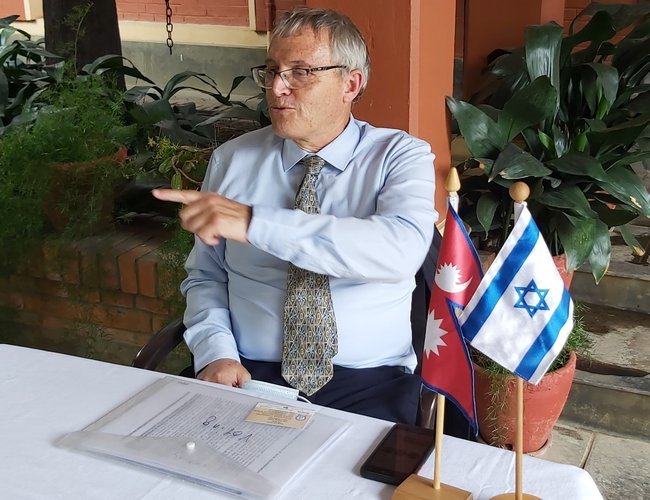
If Nepal really sticks to the policy of non-alignment, it is necessary to be non-aligned in such matters as well. Even if Nepal is absent or present in some matters, it is necessary to remain neutral without leaning on any side. In UN voting, there are four options: support, opposition, independent and absent. Nepal is not absent and votes in opposition.
If Nepal cannot say No, it can simply be absent with a statement respecting cordial relations with Israel. Having cordial and warm relations sharing so many common interests, Nepal’s support to Israel at the multilateral forum and UN voting will make the situation much more favorable to Nepal. This will also show Nepal follows the same principle not different than reality.
"We want to see Nepal always supporting Israel, but even if it did not get that opportunity, Nepal would have been true to its diplomatic policy. The issue that Nepal has been talking about is non-aligned foreign policy, but how did it become a non-aligned policy after voting against Israel? It is difficult to understand what kind of diplomacy it is to say non-aligned in the place where you should vote in favor of Israel, but to vote against it," Ambassador Goder said.
Of Course, Nepal should maintain the same neutral policy as it presents itself on the UN platform in other major events of the world.
We need to be serious that if Nepal constantly presents itself in a different way at the United Nations, it may disturb the cooperation and more endeavors to strengthen the friendship of Israel and other nations with Nepal. The presence of Nepal against Israel in an International forum may have an impact on bilateral relations. Nepal has not supported Israel in Jerusalem or any other issue.
In the near future, the same kinds of resolutions are about to be passed, and if Nepal votes against Israel, it seems that Israel may think about its relationship with Nepal.
Long live Nepal-Israel relations
Good Friendship means helping each other and exchanging all good and bad times in need. Nepal needs to understand the feelings of Israel, a close friend to be understood.
Otherwise, what are the reasons for such a level of trust between Nepal and Israel? How come Nepal is kept as a dream in the minds of young generation Israelis that have made Nepal into part of their maturing process including spending months of trekking or community work in different parts of Nepal? What are the reasons that make Israel to be the most prestigious and lucrative destination for Nepali workers? Why is that Nepali workers or students that return from Israel talk about this country with such appreciation? What are the reasons that made 200 Israeli Doctors and medical team, leave all that they were doing and come to help Nepal within 36 or 48 hours after the devastating Earthquake of 2015?
We can mention the “Learn and Earn” program which is changing the faces of Nepalese in rural areas today and we can also mention thousands of members of Shalom Club that were trained in Israel or thousands of those who spent years with Israeli families as caregivers. All is right and all is relevant.
However, they need a long background and complete explanation to understand the deepening diplomatic ties between Nepal and Israel. Each one will have a long list of details but they all share one element, which plays an important role in this intimate relationship."
It all starts when we look at ourselves in the mirror and try to identify and determine who we are: we see ourselves, Nepalese and Israelis as part of small entities, small cultures, surrounded by big neighbors. "Our identity is important for us and we will do any possible action to keep, preserve and protect it. We are proud nations that are proud of what we are and who we are. From here will come all other explanations.", Israel in Nepal explained.
We hope for many more years of true friendship and partnership between the two countries. Anything is possible, with a little faith.
May the relationship continue like this (63 years) for the next 600 years.
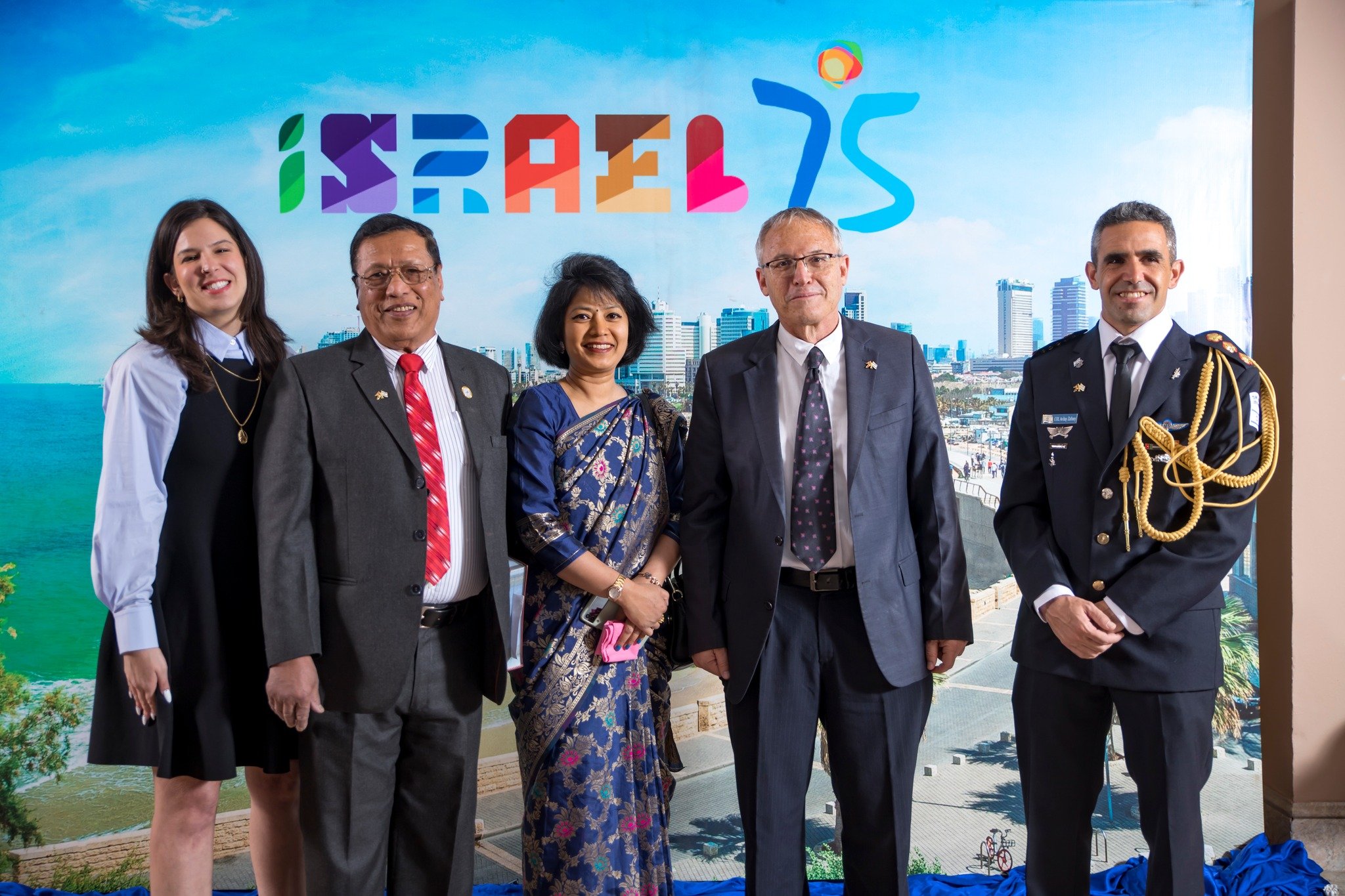



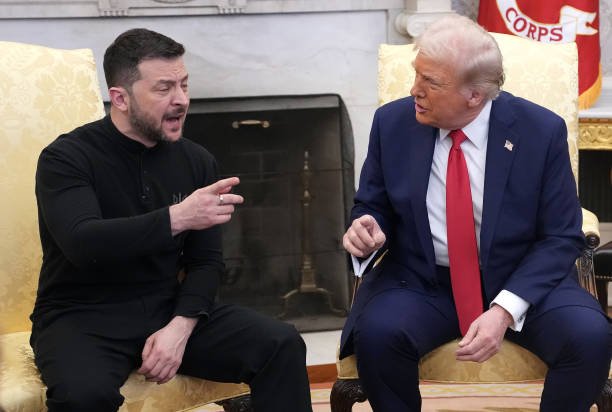
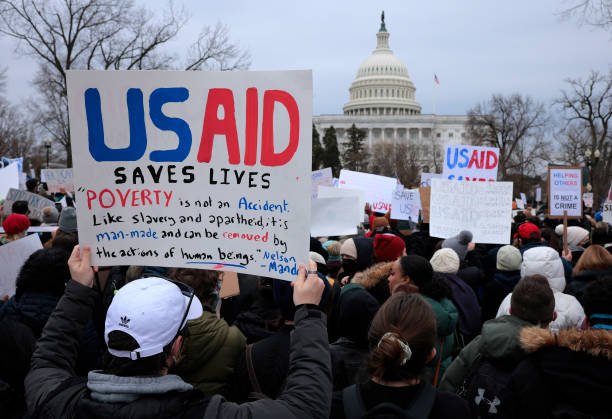
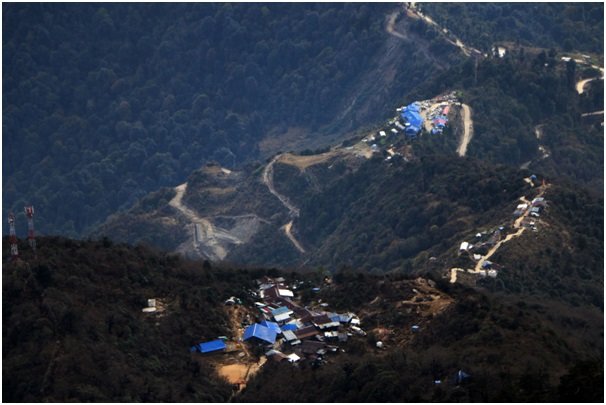
Leave Comment